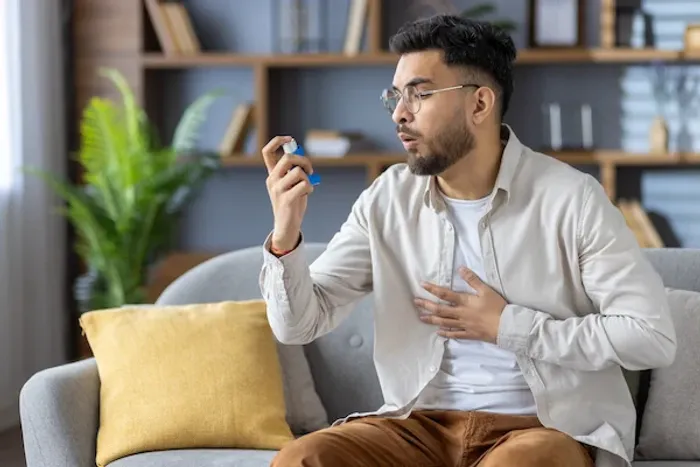Monsoon Respiratory Wellness: A Guide to Breathing Freely
Stay healthy this rainy season with tips to protect your lungs, prevent infections, and maintain clear, easy breathing in the monsoon.

Written by Dr. M L Ezhilarasan
Reviewed by Dr. Shaik Abdul Kalam MD (Physician)
Last updated on 13th Jan, 2026

Introduction
The pitter-patter of rain, the earthy petrichor scent, and the lush green landscapes make the monsoon a beloved season. However, for many, this beautiful shift in weather brings a less welcome guest: respiratory distress. The sudden increase in humidity and dampness creates an ideal breeding ground for viruses, bacteria, mold, and allergens, turning every breath into a potential challenge. If you find yourself constantly battling a runny nose, chest congestion, or a stubborn cough during these months, you are not alone. This comprehensive guide is designed to empower you with practical knowledge and actionable strategies to protect your respiratory wellness. We will delve into the reasons why the monsoon affects your ability to breathe freely, and provide a holistic plan covering your home environment, diet, exercise, and lifestyle. Our goal is to help you not just survive, but thrive during the rainy season, ensuring you can truly breathe easy and enjoy the magic of the monsoons.
Why the Monsoon Challenges Our Respiratory System
The monsoon season creates a unique set of environmental conditions that directly impact our respiratory wellness. The primary culprits are the dramatic rise in humidity and the pervasive presence of moisture. While our bodies appreciate some humidity, excessively moist air can be heavy and difficult to inhale, especially for those with pre-existing conditions. This damp environment is the perfect catalyst for a wave of health issues that target our lungs and sinuses.
The Perfect Storm: Humidity, Mold, and Allergens
High humidity does more than just make the air feel thick. It causes pollen grains to absorb moisture and burst, releasing smaller particles that are easily inhaled deep into the lungs, triggering allergic reactions. Furthermore, damp walls, wet clothes, and waterlogged areas become breeding grounds for mold and mildew. Inhaling mold spores is a significant irritant and a common trigger for asthma attacks and allergic bronchitis. Dust mites, another potent allergen, also thrive in humid conditions, adding to the inflammatory load on your respiratory system.
Common Monsoon Respiratory Illnesses to Watch For
The combination of lowered immunity (often due to temperature fluctuations) and increased exposure to pathogens leads to a spike in specific illnesses. The most common include:
The Common Cold & Flu: Viral infections spread more easily in close quarters when people are indoors.
Sinusitis: Inflammation of the sinuses caused by blockages, often exacerbated by allergens and infections.
Bronchitis: Inflammation of the bronchial tubes, leading to a persistent cough with mucus.
Asthma Exacerbations: The high concentration of allergens and irritants in the air can trigger severe asthma symptoms.
Pneumonia: A more serious infection that can develop from a neglected cold or flu.
Understanding these triggers is the first step toward building an effective defence for your respiratory wellness during the monsoon.
Consult a Pulmonologist for the best advice
Fortifying Your Home Environment: Your First Line of Defence
Since we spend a significant amount of time indoors, ensuring the air inside our homes is clean is paramount. Creating a sanctuary with good indoor air quality is one of the most effective ways to breathe freely.
Winning the Battle Against Mold and Dampness
Vigilance is key. Regularly inspect your home, especially bathrooms, kitchens, and basements, for any signs of mold growth, which often appears as black or green spots. Clean these areas with a solution of vinegar or baking soda. Use a dehumidifier to maintain indoor humidity levels between 30% and 50%. Ensure proper ventilation by opening windows for short periods when it's not raining to allow cross-ventilation and let fresh air circulate. Fix any leaking pipes or seepage issues immediately to prevent dampness from setting in.
The Power of Air Purifiers and Ventilation
For individuals with severe allergies or asthma, investing in a good air purifier with a HEPA (High-Efficiency Particulate Air) filter can be a game-changer. HEPA filters are capable of trapping microscopic particles like pollen, mold spores, and dust mites. Place them in bedrooms and living areas for the best effect. Alongside technology, don’t underestimate the power of simple habits. Using exhaust fans while cooking and avoiding drying clothes indoors can significantly reduce moisture levels and improve overall pulmonary health.
Boosting Immunity from Within: A Lung-Healthy Diet
What you eat directly influences your body's ability to fight off infections. A strategic diet to avoid respiratory infection is rich in antioxidants and anti-inflammatory compounds that strengthen your immune system from within.
Key Nutrients for Strong Respiratory Defences
Focus on incorporating these nutrients:
Vitamin C: A powerful antioxidant that boosts white blood cell function. Found in amla (Indian gooseberry), citrus fruits, bell peppers, and broccoli.
Vitamin D: Crucial for immune modulation. Monsoon means less sunlight, so include fortified foods, eggs, and fatty fish. Apollo24|7 offers a convenient home collection for tests like vitamin D if you suspect a deficiency.
Zinc: Supports the immune system and helps heal inflamed tissues. Sources include nuts, seeds, legumes, and whole grains.
Antioxidants: Compounds like beta-carotene (in carrots, leafy greens) and flavonoids (in berries, green tea) protect lung tissue from damage caused by inflammation.
Foods to Embrace and Foods to Avoid
Embrace: Warm soups (especially chicken soup, which has anti-inflammatory properties), herbal teas with ginger and turmeric, garlic (a natural antimicrobial), and probiotics like yoghurt to maintain gut health, which is linked to immunity.
Avoid: Excessive cold drinks and ice cream, which can shock the system and aggravate throat irritation. Reduce intake of fried and processed foods, which can promote inflammation. Be cautious with street food to avoid water-borne diseases that can weaken your system.
Get Your Health Assessed
The Art of Breathing: Exercises for Lung Capacity
Just like any other muscle, your respiratory muscles can be trained. Practicing specific breathing exercises for asthma and general health can improve lung capacity, clear mucus, and reduce stress.
Diaphragmatic Breathing for Deep Cleansing
Also known as belly breathing, this technique engages the diaphragm, allowing for more efficient oxygen exchange and strengthening the primary breathing muscle.
How to do it: Lie on your back with knees bent. Place one hand on your chest and the other on your belly. Inhale slowly through your nose, feeling your belly rise. Your chest should remain relatively still. Exhale slowly through pursed lips, feeling your belly fall. Practice for 5-10 minutes daily.
Pursed-Lip Breathing to Manage Shortness of Breath
This is a fantastic technique to use when you feel breathless or after physical exertion. It helps keep the airways open longer, making each breath more effective.
How to do it: Inhale slowly through your nose for two counts. Pucker your lips as if you're about to whistle. Exhale slowly and gently through your pursed lips for four counts. This creates backpressure that prevents the small airways from collapsing.
Lifestyle Adjustments for Everyday Respiratory Care
Small, consistent habits can make a significant difference in your overall respiratory wellness during the monsoon.
Staying Active Indoors When It's Pouring
Don't let the rain be an excuse for a sedentary lifestyle. Lack of activity can weaken respiratory muscles. Engage in indoor exercises like yoga, Pilates, or bodyweight workouts. Yoga, in particular, incorporates breathing practices (Pranayama) that are excellent for lung health. Anulom Vilom (alternate nostril breathing) is highly recommended for clearing nasal passages and calming the mind.
Hygiene Habits to Keep Germs at Bay
This is non-negotiable. Wash your hands frequently with soap and water, especially after coming home from outside and before eating. Carry a hand sanitiser for times when washing isn't possible. Practice respiratory etiquette by covering your mouth and nose with a tissue or your elbow when you cough or sneeze. Change out of wet clothes and shoes immediately to prevent your body temperature from dropping and becoming susceptible to infections.
When to Seek Professional Help: Don't Ignore the Signs
While self-care is powerful, it's crucial to recognise when a condition requires medical intervention. If symptoms persist beyond two weeks, consult a doctor online with Apollo24|7 for further evaluation. Be alert for these red flags:
High fever that doesn't subside.
Shortness of breath or wheezing even at rest.
Chest pain.
Coughing up blood or discolored mucus.
Symptoms that severely impact your daily life and sleep.
Early diagnosis and treatment can prevent a minor infection from turning into a major health issue like pneumonia.
Consult a Pulmonologist for the best advice
Consult a Pulmonologist for the best advice

Dr. Aakanksha Chawla
Pulmonology Respiratory Medicine Specialist
9 Years • MD (Pulmonary Medicine), IDCCM, IFCCM (Indian Fellowship in Critical Care Medicine)
Delhi
Apollo Hospitals Indraprastha, Delhi
(250+ Patients)

Dr. Keshavan. V.
Pulmonology Respiratory Medicine Specialist
10 Years • "MBBS (CMC, Vellore) MD (CMC, Vellore) DNB EDARM (France) SCE(UK) ATSF (USA) MRCPS (Glasgow) FCCP (USA) FAPSR (Japan) MNAMS"
Hyderguda
Apollo Hospitals Hyderguda, Hyderguda
(25+ Patients)

Dr Shubham Agarwal
Pulmonology Respiratory Medicine Specialist
4 Years • MBBS (Gold Medal) MD, DM (Pulmonary, Critical Care and Sleep Medicine), DNB (Medicine) , MRCP (UK), EDARM,
Lucknow
Apollomedics Super Speciality Hospital, Lucknow

Dr. K R R Umamahesh Reddy
Pulmonology Respiratory Medicine Specialist
16 Years • MBBS, MD Pul Med.
Nellore
Apollo Speciality Hospitals, Nellore
(25+ Patients)

Dr. Raju Pampana
Pulmonology Respiratory Medicine Specialist
10 Years • MBBS, MD
Kakinada
Apollo Hospitals Surya Rao Peta, Kakinada





